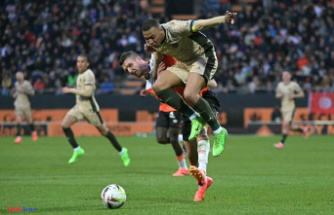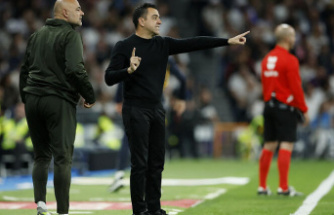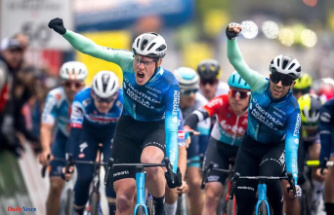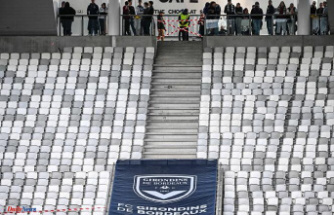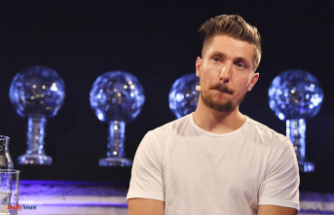Marco Reus will end his career with a few World Cup games in Russia and two, maybe three titles at BVB. The career of the two-time Footballer of the Year is one of the great oddities of the last decade. It is completely different for Mario Götze.
In a country before FC Bayern Munich, the future belonged to Borussia Dortmund. The club from the Ruhr area was the "hottest club in Europe", as the British football magazine "442" put it, and they were the "real heirs to Barcelona's throne". It's been a long time. Pretty much exactly ten years. FC Bayern Munich has incorporated the Bundesliga, Borussia Dortmund is just a bland imitation of the then still fresh "real love" that the club gets smacked at every opportunity. And nothing else is like it used to be. Time does not wait, it relentlessly moves forward and the world is changing.
Marco Reus and Mario Götze were the beating heartbeat of Jürgen Klopp's team in 2012/2013. The two former BVB youth players performed magic on the pitch and let the fans in the Westfalenstadion dream for a brief moment. Then they became too good and BVB too small for the offensive players revered as "Götzeus". The ways parted. Mario Götze announced his departure before the 2013 Champions League final. He embarked on a path that first made him a World Cup hero and then a figure of the past life.
He was never really happy at Bayern Munich, his return to BVB was a colossal misunderstanding. What else should come after the goal in Rio? In 2014, at the age of just 22, he had achieved something that German players only want to achieve every few generations: Götze had shot Germany to the world championship title. Everything that followed now could only be an encore. Götze went into exile in Eindhoven. And, as the old footballer social media wisdom always promises and seldom delivers, came back stronger.
At Eintracht Frankfurt, this club that so suddenly whirled apart the old hierarchies in German football, he has been setting the pace since this season, and at the age of 30 he is now at the height of his career. What was once a promise has become one of the strongest players in the Bundesliga and one who, eight years after Brazil, is getting a new chance to reactivate his legend status. But his participation in the 2022 World Cup in Qatar is more than a nostalgic throwback by the current national coach Hansi Flick, he has long since regained sporting importance.
"Mario is a brilliant footballer who has flashes of inspiration, who does everything intuitively," said Flick about the returnee: "He can give us a surprise or two." The 63-time national player Götze has not played for his country for five years, Götze has not won a title in Germany for more than five years. Although there was a cup victory in the Dutch exile, the five championships in the Bundesliga, the four DFB cup victories and of course the world championship title in 2014 in Brazil are long stories from the history books of German football. But now he's back.
Very different from his buddy Marco Reus, who was the even bigger promise. Back then, in the country before FC Bayern Munich, the current captain of his home club Borussia Dortmund was perhaps the biggest star of German football. Before the 2014 World Cup, he was considered a serious contender for the title of world footballer. Real Madrid, FC Barcelona, the top English clubs - the world was open to the boy from Dortmund's east. He only alienated record champions Bayern in 2012. So he decided to transfer back to BVB and not to Bayern. Dortmund invested 17.5 million euros, a crazy sum in those days. Turbo capitalism had only just reached football.
Even if it was rarely recorded in Germany, he was worshiped abroad. His llama hairstyle made him a pop icon for a short time, his fan base was worldwide and voted him on the cover of the international version of the EA Sports game FIFA in 2017. Lionel Messi was there the year before, and Cristiano Ronaldo the year after. To date, no other German player has made it onto the cover, not even another Bundesliga player.
But Reus would have loved to exchange all of that for the 2014 World Cup title and participation in the 2016 European Championship. But his body robbed him of the best years of his career, his decision for BVB in 2015, when the club was at the bottom of the Bundesliga table, the chance of a world career abroad. He wanted to continue on this path with his club. Just as it is normal at Bayern Munich, and yet is seen as a waste of talent at other clubs in Germany. Every decision against Bayern or a move abroad is a decision against a bulging trophy cabinet at the end of a career.
What is worth more in the end? A championship title with the home club or ten with Bayern? Reus was never a philosopher. But one who answered this question clearly for himself. Just the idea of winning the championship with BVB meant more to him than the reality of the Bundesliga. With Dortmund he won the DFB Cup twice. In 2017 he injured his cruciate ligament, the Tuchel crisis also spoiled the celebration. Four years later, in 2021, he cheered in the deserted Olympic Stadium. The pandemic robbed him of the journey around Borsigplatz. There was only a hint of what could have been. It was a miracle that the critics in autumn did not accuse him of a lack of mentality in overcoming the pandemic.
At the beginning of this season it was clear: Marco Reus is once again in impressive form. He gave the fickle BVB team something like stability and meaning. But then in the derby against Schalke fate struck again. Borussia hoped Reus struggled but two failed comeback attempts and certainty that he will miss another tournament. "Unfortunately, a big dream of mine has burst," he explained on Instagram and wished "his" team "every conceivable success" in Qatar. For him, only the role of the spectator remains. As so often when it comes to a tournament. At the end of his career, if he doesn't drag himself to the home European Championship in 2024, there will be a few appearances at the botched World Cup in 2018 and a few minutes at the European Championship in 2012.
Injuries, injuries, injuries. Add to that the constant talk about the lack of mentality. Even in Dortmund they don't want to agree on the south. Is Reus part of BVB's title problem or is he one without whom Borussia could not even have defended the high plateau of the last decade? Did he keep his promise or just cash in on him in Dortmund? The jury is still reaching its verdict. When she returns to the courtroom for the announcement years later, she will clear him of all allegations and add Reus to the list of Dortmund legends.
He will also be remembered internationally and his name whispered when the big questions are raised again. "What would have happened if Reus hadn't injured himself in 2014 before the World Cup? What would have happened if his body hadn't absorbed every ailment?" World football would have loved to see more Marco Reus. He shouldn't be allowed to. In a land ahead of FC Bayern Munich, nothing suggested it. Back when Mario Götze and Marco Reus played the "hottest" football in Europe.
"Everyone is only human," Reus said in an interview in 2021. And that can't even take an injury away from him. But there was a time when the 33-year-old could have been so much more. Even more than Mario Götze. And he's a World Cup hero, after all.


